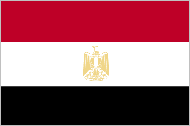Networked Economy
Egypt’s economy has gone through various stages since
the beginning of time. It
has progressed a great deal and is still progressing to become one of
the more financially stable countries in Africa.
The International Monetary Fund has ranked Egypt
as the top country in the world undertaking economic reform.
Egypt’s main source of revenue comes
from agriculture, media, petroleum exports, and tourism.
The economy is mainly run by the government, which means the
government sets the standard price for goods bought by Egypt’s
citizens. Although Egypt economy is improving, the
wealth of the citizens is not, the higher prices for goods caused the
citizens no benefits from the increase in economy.
Egypt
has a lot of corruption because how the government is using its
resources. With any country
there will be corruption if the economy is good or bad, but
Egypt
has a lot of investment and opportunities to offer such as ICT
employment opportunities, business-to-consumer electronic commerce,
business-to-business electronic commerce, and e-government.
ICT Employment Opportunities
(Stage 3)
Egypt has placed a Universal Service policy that is
designed to facilitate the penetration of ICT services to rural
underserved and commercially unviable areas of the country.
The Egyptian’s have a pilot e-Agriculture program; the Virtual
Extension Research Communication Network shows that the value chain
created through the introduction of appropriate e-agriculture programs
holds very huge potentials for generating large volume of decent jobs in
African countries.
Ø
Number of established ICT companies at 1,695 as at
2005
Ø
ICT industry provides over 5,000 direct jobs and
15,000 indirect jobs
Ø
Over 113,732 graduates of the special IT training
programs of MCIT have all been employed in the ICT industry
Ø
The 10,000 seat Call centre at the smart village
carries the potential to put 30,000 young Egyptian graduates on a steady
pay roll
Business-to-Consumer
Electronic Commerce (Stage 3)
Business to consumer
electronic commerce is very popular and it can have some advantages and
disadvantages. Egyptians can
benefit from business to consumer e-commerce by: 1. Faster and
convenient shopping 2. Offerings and prices can change instantaneously
3. Call centers can be integrated into the website. 4. Broadband
telecommunications will enhance the buying experience.
The business-to-consumer side of
Egypt
has an online grocery shopping store; where the Egyptian public can buy
things such as flowers, Egyptian Artifacts, Arabic software, and
educational resources. There
was a fair return on investment, but low revenue which was purely
experimental. The Egyptian stock market also has a better mechanism for
trade by using E stock which links all brokers with investors world
wide. Some disadvantages of
using business to consumer e-commerce are building traffic and
sustaining customer loyalty.
Business-to-Business
Electronic Commerce
(Stage 1)
More than 70% of the business
to business is either owned or controlled by the government.
Some of the projects that are in the preliminary phase in
e-commerce are: 1. Egyptian
Maritime Organization Electronic Data Interchange: This project
demonstrates the use of Electronic Data Interchange over the Internet
through Egyptian ports. 2. The Egyptian Maritime Organization hosts the
system and has secured business with the largest five shipping lines
worldwide. 3. Egyptian
Aluminum Co.: This is one of the largest companies in
Egypt's public enterprise sector; it
produces 1% of the world's aluminum. The company has been processing its
requests for proposals over the Internet. 4. Capital Exchange: This
project is a stock-trading system conducted over the Internet that links
the entire trading community of brokers with any potential investor
worldwide; it therefore provides a better mechanism for trade in the
Egyptian stock market. 5. Banking: Several banks in Egypt have only recently taken
initiatives to incorporate remote banking, intranet banking, and home
banking on different levels.
E-Government (Stage 3)
The Egyptian citizens always
complained about long lines and the time away from work to fill out
endless forms. The
government of Egypt decided to open on Saturdays
to combat with the long lines for the citizens who had Saturday and
Sunday off. The added day of
work still did not help with the long lines and time wasted; so the
government decided to start an E-government.
The online access helped with the long lines by providing the
citizens of Egypt with the option of downloading
forms at home. This in turn
will increase productivity for the country, because more people are able
to attend work instead of waiting in long lines.
The e-government project will also increase the productivity of
the government employees not having to deal with customers all day which
in turn will help the government out financially.
Another benefit for the e-government project is that it will
expand Egypt’s
telecom and IT infrastructure and enhance environment protection by
improving traffic flow.
 Egypt - Readiness for
the Networked World
Egypt - Readiness for
the Networked World